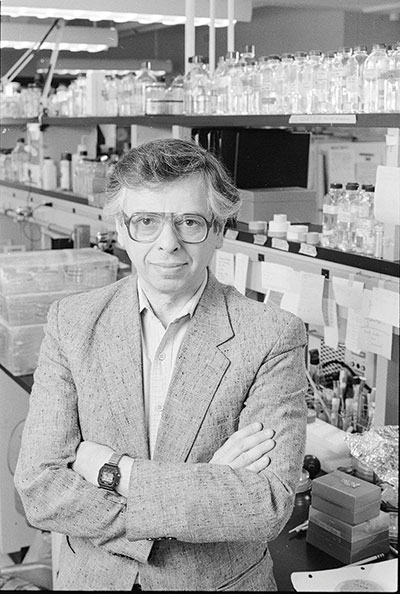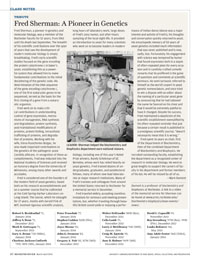Class Notes
 LEADER: Sherman helped the biochemistry and biophysics department earn national stature. (Photo: University Libraries/Department of Rare Books, Special Collections, and Preservation)
LEADER: Sherman helped the biochemistry and biophysics department earn national stature. (Photo: University Libraries/Department of Rare Books, Special Collections, and Preservation)Fred Sherman, a pioneer in genetics and molecular biology, was a member of the Rochester faculty for 52 years, from 1961 until his death last September. The breadth of his scientific contributions over the span of years that saw the development of modern molecular biology is simply breathtaking. Fred’s early scientific studies focused on the gene encoding the protein cytochrome c in baker’s yeast, establishing this as a powerful system that allowed him to make fundamental contributions to the initial deciphering of the genetic code. His determination of the DNA sequence of the gene encoding cytochrome c, one of the first eukaryotic genes to be sequenced, served as the basis for the first cloning of a gene from a eukaryotic organism.
Fred went on to make critical contributions in understanding control of gene expression, mechanisms of mutagenesis, RNA synthesis and degradation, protein synthesis, post-translational modifications of proteins, protein folding, intracellular trafficking of proteins, and degradation of proteins. Working with his wife, Elena Rustchenko-Bulgac, he also made important contributions to the genetics of the pathogenic yeast Candida albicans. In recognition of these accomplishments, Fred was inducted into the National Academy of Sciences and received an honorary degree from the University of Minnesota, among many other awards and accolades.
Fred is considered one of the founders of the modern field of yeast genetics, based both on his research accomplishments and on a summer course that he codirected at the Cold Spring Harbor Laboratory on Long Island. The course, which he cotaught for 17 years, mostly with Gerald Fink of MIT, involved rigorous scientific analysis, long hours of laboratory work, large doses of Fred’s zany humor, and after-hours sampling of the local night-life. It provided an introduction to yeast for many scientists who went on to become leaders in modern biology, including one of this year’s Nobel Prize winners, Randy Schekman of UC Berkeley, whose work has relied heavily on yeast genetics. Fred trained dozens of undergraduates, graduates, and postdoctoral fellows, many of whom now lead laboratories at major research institutions. Many of Fred’s trainees and colleagues from around the United States returned to Rochester for a memorial service in December.
Fred traveled widely, accepting countless invitations for seminars and meeting presentations, but, whether traveling through beautiful British countryside or enjoying a performance of Indian dance (dance was a major interest and activity of Fred’s), his thoughts and conversation quickly returned to yeast. His encyclopedic memory of 50 years of yeast genetics included much information that was never published and is now, sadly, lost. Fortunately, his engagement with science was tempered by humor that found expression both in a staple of often-repeated jokes for every occasion and in carefully crafted comedic remarks that he proffered in the guise of questions and comments at scientific seminars. He semi-seriously referred to himself as the world’s expert in yeast genetic nomenclature, and once tried to win a dispute with an editor about the naming of a particular yeast gene by announcing that he had tattooed the name he favored on his chest and that it would be extremely painful to have it changed. Despite his success, Fred maintained a skepticism of the scientific establishment exemplified by his often-repeated reminder that just because a certain result is published in a prestigious scientific journal, “doesn’t necessarily mean that it is wrong.”
Fred spent 16 years as chair, first of the Department of Biochemistry, then of the combined Department of Biochemistry and Biophysics. He recruited outstanding faculty, establishing the department as a recognized center of research in molecular biology. He went to great lengths to support the careers of faculty in his department and former members of his lab. He will be missed by all of us.
—Mark Dumont
Dumont is a professor of biochemistry and biophysics at Rochester.

